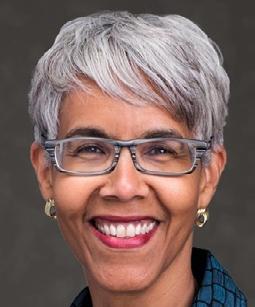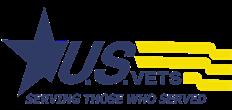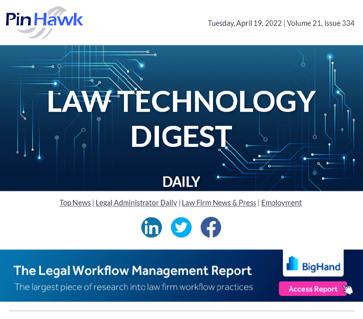Corporate Counsel Business Journal
February 2023 Edition
VOLUME 31, NUMBER 2

February 2023 Edition
VOLUME 31, NUMBER 2
HERMAN RASPÉ, A PARTNER WITH WITH PATTERSON BELLKNAP, SHARES INSIGHTS ON IN-HOUSE TECHNOLOGY AND THE TRENDS THAT WILL SHAPE THE FUTURE OF THE INDUSTRY.

INSIDE
Shaping the Culture and Future For Veterans
ALSPs Zoom into Hyperdrive
Next Generation of In-House Legal Tech
Cross-Cultural Communication
AND MORE!

The participants in the CCBJ Network demonstrate, through their many contributions, their unwavering commitment to the advancement and success of corporate law departments. The engagement and support of these “partners of corporate counsel” assure we continue to develop and distribute the news and information this unique and sophisticated audience relies on to meet the evolving legal and business needs of their organizations.
contains general information, is not intended to provide legal advice and should not be relied on to govern action in particular circumstances. The sources of material contained in this publication are responsible for such material, and any views or opinions expressed are solely those of the source.
The material in this
Please help us improve and expand our services to corporate counsel by sharing your ideas with our publisher, Kristin Calve, at 844-889-8822 or kcalve@ccbjournal.com
Carla Ford: It was the end of 2016. Darwin Thomas, a former colleague from the U.S. Attorney’s Office, was working on a part-time basis as the first General Counsel at U.S.VETS. In March of that year, I had started my own private practice. We were seated at the same table at a conference luncheon, and we caught up and enjoyed talking about our work since leaving the U.S. Attorney’s Office. A few months later, Darwin called to ask me if I knew of anybody who might be interested in succeeding him, explaining that he was ready to retire -- again.

I told Darwin that I was focused on building my practice as a plaintiff’s attorney and I would try to think of other potential candidates. A few months passed and, though I was still committed to building a viable practice, I needed regular income! I reached out Darwin to ask if the job was still open and it was! I interviewed and was selected for the job, and I’ve been extremely happy ever since.
Talk to us about your leadership style and who or what has influenced it.
Before this interview, our executive leadership team had just had a presentation about leadership styles and I realized that I and many others call ourselves “servant leaders”, but that doesn’t really describe how I lead. A “servant leader” is something different from what I learned I actually am, which is a “transformational leader”. The transformational leadership style encourages trust and transparency in the team. It can be really effective at promoting creativity in an organization. It’s a style that’s a little bit different from a servant leader, which is someone who shares authority and decisionmaking power.
I don’t fully subscribe to the servant leadership style in the sense that I do think there needs to be an ultimate decision maker, so the collaborative power-sharing that defines servant leadership isn’t exactly mine. But the part of it that I do adopt is that one’s job as a leader is to help your team think, create, and do their jobs. In that sense I’m somewhat of a hybrid.
Not everybody wants to be the CEO; some people want to be the person who’s in charge of a particular thing because that’s their passion. Carla Ford, General Counsel with U.S.VETS, sits down with CCBJ to encourage trust and transparency and promote creativity in your organization.
What qualities do you look for when bringing new people onto your team?
I would say I look for people who are going to be “on the team,” which is to say, people who recognize that when they’re at work, they’re supposed to be devoting their time, talent, education, and skills to the mission of the organization, not seeking to advance some personal agenda. I look for people who talk about how they made change in other places where they have worked, how they contributed to the mission. I like to hear them talk about whether they share credit for whatever they did with others as opposed to it all being about them. I need clarity and encouragement about whether or not I think they’re going to be “on the team.”
The culture of U.S.VETS is “get it done” and we do that with a social services organization mindset. I’d never worked with social workers before and that’s really what we are; that’s our service. “Get it done” is tempered with “get it done with compassion, empathy and grace,” understanding that the people we serve are coming to us at their worst moment in life. They’re homeless or about to be homeless, and also likely unemployed or underemployed. There are folks who were in the military (mostly; while 12 of our 13 sites serve veterans exclusively, we have a site in Hawai`i that also serves non-veterans).

We recognize that there’s a whole way of life they are no longer living and that, for some, the structure was comfort and now they’re living without it. Some have endured trauma, on the battlefield or, particularly with women, from other members of the military. Unfortunately, there are many women veterans who were sexually assaulted. With every client, we meet them where they are and we serve them with empathy.
What do you feel makes this company different from others you’ve worked with?
Well, the social workers first and foremost. I’ve always worked in law offices—at private firms, in the U.S.
501
EMPLOYEES
1,236
JOB PLACEMENTS
57,782
SUPPORTIVE COUNSELING SESSIONS
20,000 OVER VETERANS SUPPORTED EACH YEAR
888
EMPLOYMENT PARTNERS
3,061
PERMANENT HOUSING PLACEMENTS
Attorney’s Office, at a major corporation—and the driver in all of those places was, “Get it done, and we don’t really care what your problems are” or “Yes, we understand you have problems, but it’s not something that drives us.” In many of those places how you feel and the reasons why you may feel that are really tertiary, not even secondary, to the work.
I feel heard at U.S.VETS because I am at the table, in the C-suite. But I am also present for the important conversations that happen around the policies that we create and enforce. But I’m also around the table to talk about how something we may be considering doing is going to affect our employees or whether it’s fair to our employees, or how, our first consideration, how it’s going to affect our clients. Many of our clients live in housing
that we secured for them, permanent or transitional, as well as in shelters. Whenever we encounter some roadblock that is going to interfere with the housing, that’s the first conversation we’re having: How do we make sure out veterans are taken care of? We do the same for our employees. All of which is to say it’s a robust and inclusive conversation.

Our senior leadership team includes several women and African Americans. As a matter of fact, the white male is in the minority. And we have conversations as a company that I know other companies don’t have, perhaps because they’re afraid to. This was certainly true after the George Floyd murder, and it happened spontaneously; there was no directive from the National Office. At each of our sites, conversations were had around how people felt about what happened and what it said about us as a society. Of course, our COO and our CEO also sent nationwide message addressing the tragedy, but there was no hesitation to check in with everyone to help us all work through our feelings.
I felt really secure and supported and heard and I believe other employees felt similarly. But it wasn’t one and done. We’re doing the work. We hired our Diversity, Equity & Inclusion (DEI) Manager, initially, as a grantfunded position, but it is now a permanent position in our organization. Even though we’re a heavily heterogeneous organization, ethnically, with many nationalities, races and religions, genders and disabilities represented, it didn’t mean that we didn’t feel like we didn’t have work to do when it came to DEI and belonging. Moreover, DEI isn’t just a job in the company, it is an integral part of U.S.VETS strategy planning, insuring that DEI is maintained and sustained for the future.
Know your job and your place. That doesn’t mean you are the lowest person in the company and sit down and shut up and we don’t want to hear from you. What it means is understand the structure of your organization and where you fit into it so that you can manage up, down and sideways across all of those levels to serve the
mission of your organization and to build your ladder up or to the place you want to go. Not everybody wants to be the CEO; some people want to be the person who’s in charge of a particular thing because that’s their passion. If you’re not in that space yet, you’ve got to figure out how to get there.
So “know your job, know your place” is another way of saying: Make a roadmap and go up, down and across whatever path will get you to where you want to go.
Do you have any advice for those just getting started in your profession?
Assume good intentions. Don’t waste time wondering why people are supposedly “after you” or trying to sabotage what you’re doing. Reject all those negative thoughts we have when somebody hasn’t returned a phone call or an email or didn’t included you in a meeting. Instead of assuming it was done to hurt you on purpose, bring it up. Talk to that person. Say, “Oh, I see you had a meeting about this, and I wasn’t there. I think I needed to be at that. Can you catch me up on what I missed?”
When you assume good intentions, you don’t mire yourself in all that negativity or run the risk of shooting yourself in the face. Because if there was a completely innocent reason why your phone call wasn’t returned, you weren’t included in a meeting or something else happened, if you just have “the conversation,” you can find out the actual reason and then don’t have to be stressed out or send out negative energy. Because if others see you as a negative person, they may decide, “Oh, I don’t really want to work with that person” or “That person’s future with the company is doubtful.” I don’t mean that you shouldn’t be your authentic self. Just
don’t waste your time assuming that people are thinking negatively about you. Work from a positive mindset and assume their action was innocent or inadvertent or perhaps just ignorant and they just needed more information.
What changes would you like to see within the legal profession?
I’m already seeing them! I started law practice at a time when word processing was just becoming a thing. (I shared my secretary with a partner, and she still typed on carbon paper and, let me just say, she hardly ever made mistakes!) Then, the traditional law firm model included a nice office, a secretary, and the expectation that you would work yourself to death in hopes of making partner somewhere. Today, that model is going away because the younger generation doesn’t want to work that hard if it has negative impacts on their personal lives, and I applaud that—somewhat.
I say “somewhat” because sometimes “get it done” means get it done. It doesn’t mean you can put a pin in it and come back after the weekend. It means you might have to work through the weekend. That said, I think the changes that I’d like to see in the law are actually happening already because Millennials and Gen-Zers are insisting on work-life balance. Working from home has become a huge issue in many workplaces and to a degree, it has its upside; but taken to extremes, it’s not always a good thing.
What often gets lost in the rise of working-from-home is the notion of mentorship and sponsorship. The mentors teach, not just about what to do in your job, but how to do it – ethically and with integrity. I treasure the many mentors I’ve had in my career because I learned how to be an ethical, principled attorney by their examples. If your exemplars are people who cut corners and do not act with honesty and integrity, that very important part of what it means to be a good attorney gets lost. For that reason, working-from-home, whether a little or a lot, is not a great model for demonstrating those values to young lawyers in the day-to-day practice of law.
What often gets lost in the rise of work-from-home, however, is the notion of mentorship and sponsorship.










We’re going to have to lose the pejorative “alternative” label if this keeps up. And Thomson Reuters Institute is betting it will. That’s the money shot from the 2023 edition of the biennial report on Alternative Legal Services Providers published by TR with the Center on Ethics and the Legal Profession at Georgetown Law and the Saïd Business School at the University of Oxford. The market is growing “exponentially” and making “great in-roads” with corporate legal departments and law firms. “The market for alternative legal services providers is showing itself to be a highly dynamic part of the overall legal ecosystem and one that is growing at an increasing rate as it forges new paths to serving both traditional law firms and corporate law departments,” says the report, which pegs the sector at $20.6 billion and accelerating. “ALSPs are demonstrating value in helping law firms identify and implement the right technology solutions as well as providing training and support,” says Michael Abbott, head of the TR Institute. “The ALSP market increasingly includes software companies and providers of comprehensive legal technologies.” Maybe MLSPs – Mainstream Legal Services Providers is more like.




David Cohen, chair of Reed Smith’s Records & E-Discovery Group, believes in litigation readiness beyond basics such as legal holds. “It includes knowing where your data is, keeping it as long as needed for business needs and legal compliance, and then eliminating data that has served its purpose and is no longer subject to any legal hold. He has a threestep plan for data hygiene: an up-to-date data map/ inventory; knowing what you need to keep and for how long; and regular remediation of obsolete data.
Source: Lexology
Meyling "Mey" Ly Ortiz, managing counsel – labor & employment for Toyota Motor North America, discusses in Above the Law a phenomenon she recognized after moving in-house seven years ago, “detoxification,” which she describes as “culture shock” experienced by new in-house counsel – including night sweats. “I clearly remember waking in the middle of the night in a panic because I thought I’d forgotten to bill,” she writes. “I was anxious because without billing and without any work product like a brief or discovery to show, I wasn’t sure how to ‘prove’ to my new boss that I had indeed been working.” She says that when she was free of the blaming/CYA culture of law firms, she learned to get comfortable taking risks and exercising judgment — even without all the facts and data. “I had to learn to let go of fear of failure and accept uncertainty and that if I made a mistake, we would address, learn and move on.
Source: The Meybe
Adam Goss, former National President of ACC Australia, worried about post-pandemic in-house collaboration. “Throughout my career,” he writes, “I’ve worked in offices from pokey to palatial, to open plan environments. Currently, I’m in an entirely open plan, hot-desking environment, working next to my colleagues, including the CEO. An in-house team can make any of those arrangements work effectively.
Source: ACC Docket
A new report from Thomson Reuters Institute on the state of corporate law departments uncovers a subtle shift in law department priorities. “While the enduring purpose of an organization’s legal function is to safeguard the business,” the report says, “a slightly higher number of respondents in our survey cited efficiency as a stronger priority for the department.” Based on extensive benchmarking, the report discusses a set of consistent in-house themes, including the rapid evolution of legal technology and digitization and the risk that laggards will be perpetually playing catch-up; the importance of focusing on the right metrics to monitor performance and drive improvement; and the need for better modes of working with outside counsel and other outside service providers. Chock-a-block with useful information and tools, an action provides practical steps for law departments eager to act on key takeaways in the report.
Source: Thomson Reuters Institute
Deborah Enix-Ross, senior advisor to the International Dispute Resolution Group at Debevoise & Plimpton, become ABA president in August with a focus on three words: civics, civility and collaboration “The lack of understanding of civics and the lack of civility affects all aspects of our lives,” she says. “[U]nless we can manage to have people understand there are ways to engage that don’t require devolving into some of the chaos we’ve seen, we really are at an inflection point in our society.”
Source: ABA Journal
E-discovery competitors Exterro and Zapproved have joined forces to better deal with the convergence of e-discovery, privacy, digital forensics and incident response. GCs, the companies says, have become the “risk quarterback” in charge of not just litigation but cybersecurity and all the other work. It is all converging under the GC.
Source: Legal IT Insider
Legal GRC Platform Exterro Announces Acquisition of Zapproved
Banking Partners Géraldine Lezmi and Jean-Christophe David join Weil in Paris
OpenText Fuels Business 2030 with Cloud Editions 23.1 Release
Bridget M. McCormack
Officially Begins New Role as President & CEO of AAA®
Clifford Chance advises Grenergy Renovables on its completed acquisition of Sofos Harbert Renewable Energy
Lindsey Pitt Joins Epiq Legal Business Advisory as Vice President of Legal Operations Consulting
Experienced Bankruptcy Partner Gregory G. Plotko Deepens Bench In New York at Barnes & Thornburg
Wolters Kluwer Announces New Enhancements to AIPowered Legisway
Akin Gump Opens Boston Office with a Focus on Alternative Investment Management Industry
Newly Available App Seamlessly Connects iManage And Clio
Sprinklr Appoints Jacob Scott as General Counsel and Corporate Secretary
Joseph A. Ferraro Joins
Catalent as Senior Vice President, General Counsel, Chief Compliance Officer, and Secretary
Karrie Rexford Appointed Senior Vice President, General Counsel at Carbon
Too busy to read it all? Try these books, blogs, webcasts, websites and other info resources curated by CCBJ especially for corporate counsel and legal ops professionals.

According to Richard Brzakala, senior global director of external legal services with Canadian bank CIBC, there are many cost-control strategies in-house leaders can use to soften the blow of rapidly rates.
“There are many familiar options that CLDs have at their disposal — such as tiering, RFPs, volume discounts, panel convergence, budget structuring, and in-sourcing — although these approaches . . . may take time to mitigate the impact of proposed rate increases,” writes Brzakala, who provides an array of fast-acting countermeasures: rebates; valued-added services; rate management policy; ALSPs; staffing ratios; disbursements & cost recovery; and quick-pay discounts.

The role of the CLO continues to grow at many organizations, according to ACC’s 2023 Chief Legal Officer survey “The Age of the CLO shows no signs of letting up,” says Veta T. Richardson, ACC president & CEO, who points to the continuing expansion and diversification of CLO responsibilities. “The value of applying their unique training and experience to roles outside the traditional legal function is increasingly being recognized as beneficial to the strategic and operational needs of their organizations.”
Law is the most stressful occupation in the U.S., according to an analysis by the Washington Post of data from the U.S. Bureau of Labor Statistics. So what’s a JD to do? Maybe check out a lower stress, higher happiness field such as agriculture, logging and forestry. Still . . . the Post also reports that these workers also have the highest levels of pain at work. Kathleen Parker, Post columnist surmises that lumberjacks, foresters and farmers are happiest because they spend their time closer to nature, which aligns with the data, which show that respondents rated the outdoors among their happiest places.

Thanks to the law firms, technology companies, alternative legal service providers, management consultants and other supporters of corporate law departments who share their insights and expertise through the CCBJ network. Your participation is appreciated.
Clifford Chance advises Multibank on US$300 million notes issuance
FTI Capital Advisors Assists e& on Acquisition of ServiceMarket
AAA® Appoints Matthew Conger as Washington, D.C.-Based Vice President in Commercial Division
Weil Represents Meta in High-Stakes Trial Victory Over FTC
Carla Ford is the General Counsel for U.S. VETS. She is responsible for providing legal advice to officers and directors in the organization, assisting in the management of company risks, and overseeing the company’s legal matters, including contract formation, litigation, dispute resolution, and protection of the company’s property rights. Reach her at cford@usvets.org

Herman Raspé is an internationally renowned authority in the field of cross-border debt and equity transactions, particularly American Depositary Receipts matters. Raspé served as Chair of the Firm's Corporate department from 2005-2019 and has concentrated his practice on cross-border capital markets and M&A transactions. Raspé represents U.S. financial institutions and non-U.S. companies in a myriad of crossborder transactions. Reach him at hhraspe@pbwt.com

Ako Shimada is Vice President, General Counsel and Corporate Secretary of Ushio America, Inc., and General Counsel of Ushio Europe B.V. in the Netherlands, leading providers of light sources and solutions for a variety of applications including scientific, medical, semiconductor, entertainment, horticulture, and architectural applications. In her role as General Counsel and Corporate Secretary, Ako oversees the company’s legal, compliance, risk management, and corporate governance matters. Reach her at ashimada@ushio.com
Barnes & Thornburg Continues Expansion In New Jersey And Pennsylvania With The Addition Of Five Attorneys
Cooley Bolsters Private Equity and M&A Capabilities With Addition of FivePartner Team in Denver Special Situations and Private Credit Partner Catherine Goodall joins Akin Gump in New York

Brian Franklin, Former Duke Energy Regulatory Director, Joins McGuireWoods
Arnie Fridhandler Rejoins
Weil as Private Equity Partner in New York
Robert Hilton Expands IP Practice for Barnes & Thornburg in Dallas
Live Nation hires ex-Latham antitrust chief Dan Wall
Colin Stretch Joins Etsy as Chief Legal Officer and Corporate Secretary
Sam Khichi Named Executive Vice President, Chief Policy Officer and General Counsel for CVS Health

CCBJ: To start out, please share your background with our readers, including your involvement with the WSG–Legal 500 Survey of In-House Legal Technology.
I am a partner at Patterson Belknap Webb & Tyler in the capital markets group with a focus principally on equity, but also cross-border debt transactions. Patterson Belknap is an independent firm in New York with one office where my practice has thrived, which is very unusual in that you wouldn’t think a single-office firm would be able to host, foster, and grow a practice of this type. I have been able to
do this principally because of two things. One, the network that we’re members of, World Services Group, puts us in contact with incredibly well-heeled and well-entrenched law firms in their jurisdictions around the world with whom we work all the time. And secondly, the ability to use technology to facilitate interaction among lawyers, the servicing of clients, the teaching of our associates, the exchange of lawyers among firms.
In the survey that you conducted in conjunction with WSG and Legal 500, 92 percent of the respondents said it was very or somewhat important that law firm partners are up to date with technology. How is that playing out for WSG members?
I think the COVID pandemic has been an absolute game changer in the legal profession in general, but also for

the members in WSG. Pre-COVID, if you look at the way lawyers approached the adoption and use of technology in their practices and particularly their communications with clients and colleagues, was very often viewed as an obstacle, something you had to contend with and that didn’t come very naturally, particularly video conferencing. When COVID hit, we all went home with our laptops if we had them, or the firm delivered laptops to our home, and the practice of law really changed.
interaction on ice. But we didn’t have to. We came to view technology as an incredible tool to foster connection and cooperation, not by meeting in person, not by flying to London, not by having traditional conference calls made through an analogue landline, but by having significant amount of online interaction via Zoom, WebEx and other novel means of communication. I think from the network’s perspective, we were able to pivot very quickly from inperson meetings to virtual ones.
However, Zoom fatigue is real. At some point, you get a little fed up only seeing people on screen. But now that we are back in our offices having in-person or hybrid meetings, virtual participation is really welcome. Whatever helps people get together and cooperate! Some people want to go back to more traditional ways of communication, but overall, technology allows us to communicate in different ways, to practice in different ways, and work together in perhaps a more informal way, which really is very welcome.
When asked if legal tech that uses AI should be more regulated, 72 percent did not think current regulatory frameworks are enough or were unsure. Do you think that this concern will slow the adoption of AI in legal practice?
Herman Raspé is an internationally renowned authority in the field of cross-border debt and equity transactions, particularly American Depositary Receipts matters. Raspé served as Chair of the Firm's Corporate department from 2005-2019 and has concentrated his practice on cross-border capital markets and M&A transactions. Raspé represents U.S. financial institutions and non-U.S. companies in a myriad of crossborder transactions. Reach him at hhraspe@pbwt.com

We didn’t have a choice. You couldn’t go to the office. You couldn’t practice the way you were used to practicing, so technology became a resource that was much more readily adopted, and I would say embraced much more than before—first because you didn’t have a choice and second because you became very adept at it. Within WSG, we pivoted very, very quickly from an environment of mostly email-based communications to online meetings, online resources, online cooperation with folks that we knew from many in-person meetings, but now were cooperating with via Zoom and other technology-enhanced meeting spaces. And we not only interacted more frequently but also got to know a lot of new colleagues. Without technology, we would have had to put the network
I don’t think it’s going to slow down at all. With more and more technology being adopted and AI making significant strides in our profession, in our clients’ businesses and in the way regulators interact with us and our clients, the questions, challenges and regulatory environment around AI are going to become a much bigger part of the dialogue that we are in.
AI is already expanding in the area of research and product development. In the legal profession, you’re seeing it on both the compliance and enforcement sides. In a litigation context, AI has proven helpful in analyzing enormous amounts of data in a much more sophisticated way. But as more AI-related matters come across my desk, I worry about who exactly is practicing law. Is it the computer?
The person who enables the computer? The software developer? If some server somewhere is “practicing law” who has oversight and control? These are interesting issues that we’re going to need to face and address as AI permeates more and more of our practices.
Another set of issues is how to protect against AI infringing intellectual property. Or is an AI application creating intellectual property that needs to be protected? And if so, who owns it? I’m not sure it’s going to be such an easy question to answer.
Consider also if AI is generating legal output, is it really attorney work product? Is it protected from discovery? Is it confidential? And then there are the more general issues of cybersecurity, data privacy, communication privacy. Who takes responsibility for monitoring AI systems and output? There’s going to need to be a significant amount of guidance and thinking about how this is regulated.
55 percent of GC respondents said the need for legal tech adoption has increased. As the chairman of WSG, how do you think WSG members will respond to this outlook?
I think people are going to respond very, very favorably. Within the World Services Group, we are fostering the lawyers who have been identified or come forward as really emerging leaders in their firms or practices, and many of them are very tech-savvy, view technology as being extremely helpful to their practice, using it very effectively to promote their practice and assist them in work-life balance issues. For example, I have noticed that young lawyers who are part of the emerging leaders’
group within our firm readily use technology to build their network of contacts at other firms. So, I think legal tech is going to be looked at very favorably.
There are a number of them. One area is cost. When I look at how law firm budgets have evolved over time, budgets tend to be based on: What did we do in the past? How did we cover our expenses, fixed, variable, etc.? While technology was certainly increasingly a large line item, I think it will need to be a much more significant line item. And there’s no question that testing, adoption, training, integration of different technologies will be expensive for firms. Obviously, there are many arguments to be made why this is very good for firms: you can reduce your carbon footprint, reduce your square footage footprint, reduce your rent payments, be more flexible in terms of employment practices, etc. But for most firms, IT investments are a significant expense.
The second challenge I have observed—within my firm, within WSG and in my personal life is the more we get used to technology, the less patience we have it. It has to work immediately. It has to work all the time. It has to be reliable. How many passwords do I need to remember?
A lot of folks get very frustrated when faced with new technology if it doesn’t readily integrate with what they’re used to doing. It was one thing to change from WordPerfect to Word in an environment where most of the typing was done by typing pools and word-processing centers and personal assistants. But when you have a major technology upgrade today, if it isn’t integrated well, if it doesn’t work efficiently, there’s enormous frustration within the organization. And even as technology advances ever more rapidly, we are still struggling with legacy computers, legacy systems, legacy code, etc., and that’s going to be another challenge.
Technologization” of the profession is a wonderful thing. Daunting at times, but wonderful.
What is your advice to attorneys or other executives looking to advance their organization’s capacity in legal technology?

Embrace it! One, there are incredible opportunities— professionally, personally, and intellectually—in adopting, testing and using new technology within your organizations. Yes, there are challenges, but to the extent that you are a professional and enjoy the challenges of your profession, you should be welcoming technological changes/opportunities as another facet in your professional development. I would not want to go back to the way we practiced law 25 or 30 years ago. I really enjoy the fact that a tremendous amount of the drudgery has been taken out of the practice of law thanks to technology. Black-lining, proofreading, distributions, access to information are just a few of the things that are now
available at your fingertips, and that enable you to much more creative because you are not bogged down pushing papers through very inefficient streams of distribution and review and so on.
“Technologization” of the profession is a wonderful thing. Daunting at times, but wonderful. One last thing I would say about it is how much I have enjoyed looking and experiencing and experimenting with new, technologyenhanced ways of building relationships with clients, building relationships within the WSG network, with other lawyers, and with other firms. Client development pieces don’t need to be in memos that are 30 pages long with 70 defined terms. Bullet points have become an acceptable way to communicate. Podcasts are extremely effective. Legal communication does not need to be as formal as it used to be. I enjoy it. I say embrace it.
Ako Shimada, Vice President, General Counsel and Corporate Secretary of Ushio America, Inc., sits down with CCBJ to discuss her roots and how cultural sensitivity is key to harmonious and successful multinational teams.
I was born and raised in Japan, and I've been practicing in California for over 20 years. I was in private practice for more than eight years, primarily involved in commercial litigation and intellectual property litigation and protection. In 2008 I went in-house with a major healthcare company where I spent about six years. My focus was regulatory compliance, which included doing a lot of internal investigations. I joined the Ushio group in 2014, initially as assistant general counsel for Christie Digital Systems, Ushio America's sister company, which provides digital projection systems worldwide, and then, in 2017, I moved to Ushio America in as general counsel. In 2021, I became the general counsel of Ushio Europe. I work closely with our parent company, Ushio, Inc., visiting it a couple times a year.
Please talk about your involvement with Practicing Law Institute.
I've been on the faculty of PLI's Advanced Licensing Agreement seminar. It's a two-day course and I've been teaching the international licensing segment for about four years. Based on my experience in IP, litigation and management and my work with my Japanese parent company colleagues. I've been doing that for five years. It's been a very rewarding, interesting experience. All the PLI faculty members I work with are so smart and so experienced. It's been great working alongside them.
I understand that you are heavily involved with mergers and acquisitions and advising Ushio on such matters. What can you tell us about the priorities there and how you navigate that system?
I am Vice President, General Counsel and Corporate Secretary of Ushio America, a wholly owned subsidiary of Ushio, Inc., which is based in Tokyo. So any M&A matter requires board and parent company approval. My parent company has a committee that evaluates potential M&A opportunities. We have to work closely with them, and they're all Japanese. So things can take longer than working for a US company as Japanese culture is very consensusdriven. Things are very carefully evaluated and for any significant proposal or project, you have to go through a formal approval process. So you need to build in enough time to make the project move forward, and you cannot expect something to be decided very quickly.
Also the culture of it is very important. I've been involved in one project where we invested a significant amount into a company, but culture-wise, it was not a great fit. And it's very challenging for Japanese executives to manage a very domestic company. That's unique to a Japanese company and particularly between Asian and American cultures. Culture clash may not be as challenging for a European company acquiring an American company, or vice versa, but having been involved in several M&A projects since I joined Ushio group, it’s been my experience that things aren’t as easy and smooth between an Asian company and a US company.
Tell us about your work with the board and executive committee on various things like IP, M&A, litigation matters. What's your communication process, because obviously they're not experts in these areas and they rely on you, especially within the landscape of the United States.
Ushio America has regular board meetings and as the corporate secretary I attend them all. I also discuss litigation and legal issues as part of the board meeting agenda. In addition, I have weekly calls with Japan. I'm particularly involved with one business unit regarding intellectual property issues. We discuss pretty specific technology, patent, and technical stuff. I work with folks with technical backgrounds. The COO at my company is from Japan so he has very close communication with Japan, as does my CEO.
We all talk to Japan on an individual basis; it's not really hierarchical, which I really like about my company.
What are some of the key issues that face multinational organizations?
It's extremely important to understand the culture and listen really well. You cannot insist on your way of doing things. You need to listen and adapt to the culture of the company, especially if it's foreign-owned, because what you think people should understand is not necessarily the case. Basically we’re all creatures of how we are raised and where we grew up and the cultures that we’re used to. So you need to try to understand other points of view. It's already challenging trying to do that with your American colleagues as we’re a diverse society. But to do well in a multinational enterprise you have to be even more culturally sensitive. So my number one advice is to try to understand and listen.
Are you responsible for compliance with the SEC, the DOJ and other US regulatory bodies?

Does that trickle up to the Japanese government and their regulatory as regulatory landscape as a subsidiary or a body here?
Because our parent company is in Japan and is publicly traded, it is subject to the “J-SOX,” which is the Japanese equivalent of the Sarbanes-Oxley Act. So it is subject to many reporting and internal control obligations which, as a wholly-owned subsidiary, we also have to observe. In addition, I have to pay attention to regulatory developments in Europe because I also oversee European legal concerns. That can be a challenge because it's not easy to keep track of all the new developments in Europe, which is a consumer friendly, environmentally sensitive, regulatory culture. Every year you encounter new directives and new laws.
Ako Shimada is Vice President, General Counsel and Corporate Secretary of Ushio America, Inc., and General Counsel of Ushio Europe B.V. in the Netherlands, leading providers of light sources and solutions for a variety of applications including scientific, medical, semiconductor, entertainment, horticulture, and architectural applications. In her role as General Counsel and Corporate Secretary, Ako oversees the company’s legal, compliance, risk management, and corporate governance matters. Reach her at ashimada@ushio.com
We are not publicly traded, so not the SEC, although we still keep SEC regulations in mind to the extent that many of our customers are subject to those regulations so as a supplier, we have to be mindful of meeting any obligations that apply to suppliers. As for the DOJ, we have to be careful about antitrust and any other regulations that apply to private companies.
As I mentioned above, my number one advice is to be a good listener—no matter what type of company you work for, but especially if it's a multinational company. Be authentic, open and inclusive in your leadership style, especially when you work with people from diverse backgrounds, because everybody has a different communication style—especially Japanese. They don't really speak up as much as Europeans or Americans, so you need to really pay attention to them and then ask them what they think, because they don't like to talk over other people; they're very polite. Part of being inclusive and culturally sensitive is adapting your communication style because you can be perceived as being too aggressive.
My number one advice is to be a good listener—no matter what type of company you work for.
 THOMAS E. SPAHN M C GUIREWOODS LLP
THOMAS E. SPAHN M C GUIREWOODS LLP
Fair Labor Standards Act cases frequently involve privilege issues, in part because employers' treatment of employees' status and their treatment of compensation frequently (if not normally) implicate legal advice that those employers have received.
In Raymond v. Renew Therapeutic Massage, Inc., Civ. Case No. 18-13760, 2022 U.S. Dist. LEXIS 196908, at *2 (E.D. Mich. Oct. 28, 2022), plaintiff filed a Motion in Limine "seeking to exclude evidence or testimony related to advice of counsel regarding [defendant] Renews' classification of [plaintiff] Raymond as an independent contractor" for compensation purposes. Plaintiff filed her motion after defendant's counsel noted during a pretrial conference "that he intended to defend against [plaintiff]'s FLSA claims and damages by using the advice of counsel defense." Id. at *3. The court granted plaintiff's motion, noting that: (1) defendant Renew "never identified an advice of counsel affirmative defense on the record" (id. at *11-13); and (2) Renew "refused to allow Raymond to inquire about the legal advice obtained by [defendant's deponent] in a deposition,
asserting attorney-client privilege." Id. at *16. Although not using the word karma, the court explained that "it would be unfair to Raymond to argue against a defense regarding communications that she was prevented from inquiring about during discovery." Id. at *17.
Three days later, the court in Walters v. Professional Labor Group, LLC, addressed a fascinating issue triggered when defendant's Rule 30(b)(6) witness "appeared to assert an advice of counsel defense" based on advice he had received from the defendant's lawyer. No. 1:21-cv-02831-JRS-MJD, 2022 U.S. Dist. LEXIS 197345, at *1 (S.D. Ind. Oct. 31, 2022). As it turned out, the witness had received that advice fourteen years earlier — when he was employed by a different company which was then represented by the same lawyer. Understandably labeling the situation a "conundrum," the court held that: (1) the previous employer owns the privilege protection covering that earlier advice; (2) absent that previous employer's waiver, the defendant would be prohibited "from offering testimony or other evidence relating to any advice of counsel" its executive received while employed at the previous company that owned the privilege. Id. at *2-3.


Attorney-client privilege protection depends on content, and some work product claims also depend in part on content. Because a litigant's privilege log obviously does not disclose withheld documents' content, the adversary often seeks the court's in camera review of those withheld documents.
Courts disagree about the standard for undertaking such in camera reviews. In Wisk Aero LLC v. Archer Aviation Inc., the court articulated the majority view (citing a Ninth Circuit case): "the decision whether to conduct the [in camera] review rests within the discretion of the district court." Case No. 21-cv-02450-WHO (DMR), 2022 U.S. Dist. LEXIS 202429, at *4-5 (N.D. Cal. Nov. 7, 2022) (citation omitted). Two days later, the court in Akerman LLP v. Cohen articulated the rare minority view — noting that "[f]or over thirty years," the court has held that before being required to turn over withheld documents a litigant "is entitled to an in camera
review of the documents by the trial court." Nos. 4D22-553 & 4D22-556, 2022 Fla. App. LEXIS 7611, *19-20 (Fla. Dist. Ct. App. Nov. 9, 2022) (citation omitted).
Lawyers on both sides of this issue must check the tribunal's approach. The vast majority recognizes the trial court's discretion, but some courts always conduct an in camera review before ordering production of withheld documents.
A few days after the decisions summarized in last week's Privilege Point, the court in Adams v. Hanover Foods Corp. described its in camera review's conclusion, which highlights why many courts conduct such reviews: "Our review of the emails — where the defendants assert a privilege demonstrates that they consist mainly of business communications and not requests for legal advice or legal assistance to the defendant." Civ. A. No. 1:21-cv-00909, 2022 U.S Dist. LEXIS 210101, at *5 (M.D. Pa. Nov. 18, 2022). Such conclusions should remind lawyers to train their clients and discipline themselves to make sure that any legitimately privileged communications reflect clients' requests for legal advice and lawyers' responsive legal advice.
Presumably because it would tie up judicial resources in nearly every court, the same judge overseeing the litigation ordinarily conducts the in camera review. In a perfect world, another judge would do that. So litigants should remember that even if they win a privilege dispute, the judge hearing their case will have read the documents — so litigants and their lawyers should always be careful what they write.
CEO: Tim Flannery
HQ: New York, NY
# of Employees: 29
Total Raised: $15M
Post Valuation: $40M
Institutional Investors:
• Motley Fool Ventures

• Company Ventures
Twitter: @PassthroughInc
URL: passthrough.com

Description:
Developer of fund-closing software designed to seamlessly manage subscription document distribution, execution, and compliance. The company's software automates the subscription process for private funds and makes it easy to distribute subscription agreements to investors and have them executed electronically with real-time validation, extended document validation, and so on, enabling attorneys, general partners, and investors with a seamless workflow and fully executed subscription document.
The company raised $10.00 million of Series A venture funding in a deal led by Positive Sum on February 1, 2023, putting the company's pre-money valuation at $30 million. Company Ventures, Great Oaks Venture Capital, Motley Fool Ventures, and Broadhaven Capital Partners also participated in the round. The funds will be used toward product R&D, marketing, and scaling Passthrough's core offering.
Source: Pitchbook (As of Feb. 2023)

